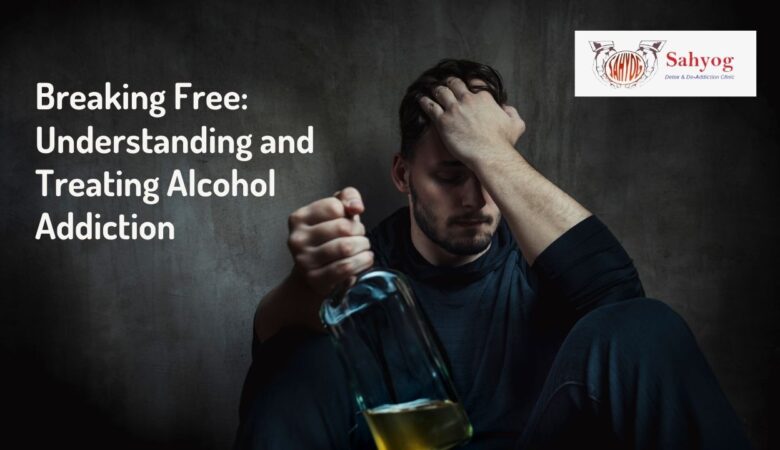Craving Control: Breaking Free from Alcohol Dependence
Introduction to Alcohol Dependence Are you struggling to break free from the grip of alcohol dependence? You’re not alone. Millions of people around the world find themselves caught in a cycle of cravings and dependency, desperately seeking a way out. But don’t lose hope – there is light at the end of the tunnel. In this blog post, we’ll explore the ins and outs of alcohol dependence, diving deep into its triggers, physical and mental effects, as well as available treatment options. We’ll also discuss effective strategies for managing those relentless cravings that can feel like an endless battle. But breaking free from alcohol dependence isn’t just about addressing the immediate challenges; it’s about making lasting lifestyle changes that support your recovery journey. So get ready to take control of your cravings and reclaim your life! Join us as we embark on this empowering journey towards freedom from alcohol addiction. Together, we’ll navigate through the complexities of craving control with knowledge, empathy, and determination. It won’t be easy, but trust us when we say it will be worth it! Let’s dive in! The Triggers for Cravings Cravings can be powerful and overwhelming, especially when it comes to alcohol dependence. Understanding the triggers that lead to these cravings is a crucial step towards breaking free from this cycle. One common trigger is stress. When we’re stressed, our bodies release cortisol, which can increase alcohol cravings as a way to cope with the tension. Other emotions like sadness, anxiety, or boredom can also act as triggers for craving alcohol. Social situations can play a significant role in triggering cravings as well. Being around friends who are drinking or attending events where alcohol is readily available may make it harder to resist the urge to drink. Environmental cues such as certain smells or places associated with drinking can also activate cravings. For example, walking past a bar you used to frequent or seeing an advertisement for your favorite alcoholic beverage might bring back memories and trigger intense desires. Another factor that influences cravings is physical discomfort or withdrawal symptoms caused by not consuming alcohol regularly. These symptoms may include sweating, trembling, nausea, and insomnia – all of which can drive someone towards seeking relief through drinking. Understanding these triggers allows individuals struggling with alcohol dependency to develop effective strategies for managing their cravings. By identifying specific situations and emotions that prompt them to reach for a drink, they can find alternative coping mechanisms and healthier ways of dealing with stressors or negative feelings without turning to alcohol. It’s important to remember that everyone’s triggers will vary based on their personal experiences and circumstances. By working closely with healthcare professionals specializing in addiction treatment and therapy programs tailored specifically for their needs, individuals seeking recovery from alcohol dependence will gain valuable tools and techniques necessary for overcoming their triggers effectively. The Physical and Mental Effects of Alcohol Dependence Alcohol dependence can have profound physical and mental effects on individuals. From a physical standpoint, excessive alcohol consumption can wreak havoc on the body. Liver damage is a common consequence, as well as an increased risk of heart disease, cancer, and pancreatitis. Alcohol also impairs the immune system’s ability to fight infections, leaving individuals more susceptible to illness. On a mental level, alcohol dependence takes a toll on emotional well-being. It disrupts brain chemistry and alters neurotransmitters that regulate mood and behavior. This can lead to symptoms such as depression, anxiety, irritability, and even cognitive impairment. The effects of alcohol dependence are not limited to the individual; they extend to relationships with family members and friends as well. Emotional distancing often occurs when loved ones witness the destructive behaviors associated with addiction. It’s important to recognize that these physical and mental effects are not fixed or irreversible. With proper treatment and support, individuals can begin their journey towards recovery and heal both physically and mentally from the damaging effects of alcohol dependence. Remember: seeking help is never a sign of weakness but rather an act of courage in taking control of your life! Seeking Help: Treatment Options for Alcohol Dependence When it comes to alcohol dependence, seeking help is a crucial step towards recovery. There are various treatment options available that can assist individuals in breaking free from the grip of alcohol addiction. One common approach to treatment is residential rehabilitation programs. These programs provide a safe and structured environment where individuals can receive intensive therapy and support. They often include individual counseling, group therapy sessions, and educational workshops to address the underlying causes of addiction and develop coping mechanisms. Outpatient treatment is another option for those who may not require 24/7 supervision or have commitments they cannot put on hold. This type of program allows individuals to attend therapy sessions while still maintaining their daily routines. Medication-assisted treatment (MAT) combines medication with behavioral therapy to manage cravings and reduce withdrawal symptoms associated with alcohol dependence. Medications such as naltrexone, acamprosate, and disulfiram can be prescribed by healthcare professionals to aid in the recovery process. Support groups like Alcoholics Anonymous (AA) provide individuals with a platform to connect with others who have similar experiences. These groups offer mutual support, encouragement, and guidance throughout the recovery journey. Cognitive-behavioral therapy (CBT), motivational interviewing (MI), and dialectical behavior therapy (DBT) are evidence-based therapeutic approaches used in treating alcohol dependence. These therapies aim at changing unhealthy thought patterns, behaviors, and attitudes towards alcohol consumption through techniques such as identifying triggers, developing coping skills, setting goals, and enhancing self-awareness. Remember that everyone’s journey towards sobriety is unique; what works for one person may not work for another. It’s essential to consult professionals who specialize in addiction medicine or mental health when considering your treatment options. Taking that first step towards seeking help shows courage and determination – you don’t have to face this battle alone! Reach out today because there is hope for a brighter, healthier future. Strategies for Managing Cravings When it comes to managing cravings, having a plan


